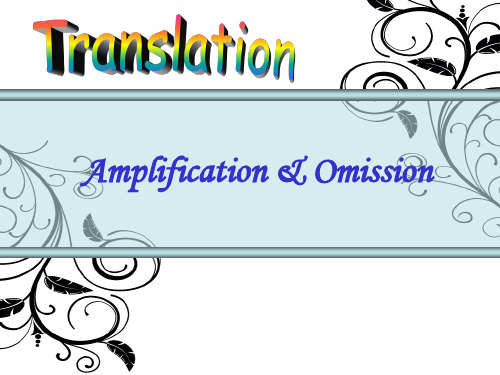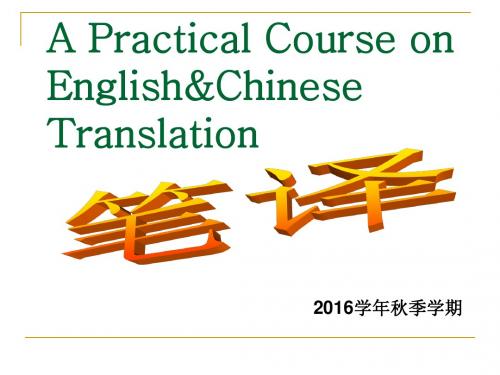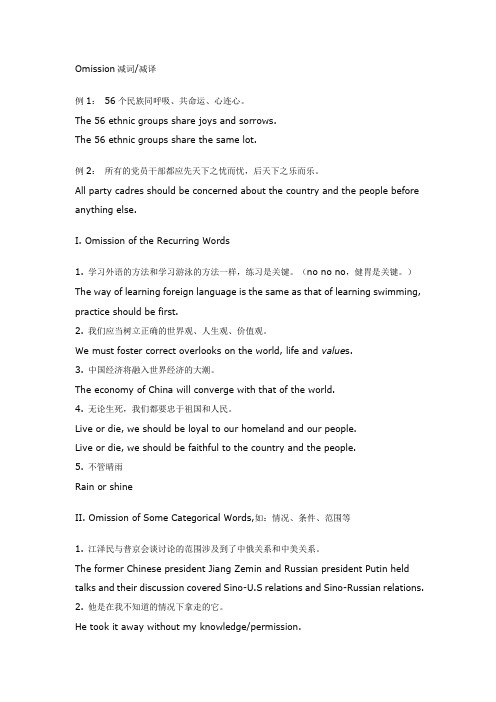减词法(omission)
9.翻译技巧之减词法

• Whether the laws are good or bad, they cannot complain, they cannot question, they cannot suggest changes. • 无论法律是否公正,他们都无法抱怨、无法 无论法律是否公正,他们都无法抱怨、 质疑、无法建议修改。 质疑、无法建议修改。
• 2.英语中的泛指人称代词作主语时,常常可以省略, 英语中的泛指人称代词作主语时,常常可以省略, 英语中的泛指人称代词作主语时 翻译成无主句。 翻译成无主句。 • As you come into the room, you’ll notice a piano. • 一进房间门,就会看见一台钢琴。 一进房间门,就会看见一台钢琴。 • One can never be too careful in one’s work. • 工作越仔细越好。 工作越仔细越好。 • Fight when you can win; move away when you cannot win. • 打得赢就打,打不赢就走。 打得赢就打,打不赢就走。 • We have 7 days a week and 24 hours a day. • 一周有七天,一天有 小时。 一周有七天,一天有24小时 小时。
• 3. 作宾语的代词 翻译时也可以省略 宾语的代词 翻译时也可以省略. 的代词,翻译时也可以省略 • Please take off the old picture and throw it away. • 请把那张旧画摘下来扔掉。 请把那张旧画摘下来扔掉。 • Gathering facts, confirming them, suggesting theories, testing them, and organizing findings– this is all work of science. • 收集事实并加以论证,提出理论并加以检验,以 收集事实并加以论证,提出理论并加以检验, 及整理研究成果——这全都是科学工作的内容。 这全都是科学工作的内容。 及整理研究成果 这全都是科学工作的内容
Lecture 4 Amplification & Omission 增减法

• Recourse to arms is not the best solution to a quarrel between countries.
• 国与国之间的争端诉诸武力,并不是最好的解决 方法。
• evaporation • fault-finding • loftiness • Necessity
• Foreigners get degrees from Chinese colleges. • 一批外国人获得一些中国大学的学位。 • In spite of difficulties, he succeeded in finishing his task. • 尽管困难重重,他成功地完成了任务。 • Bodies of dead Japanese devils were lying all round. • 他周围躺着全是日本鬼子的尸体。
• According to scientists,it takes nature 500 years to create an inch of topsoil.
• 根据科学家们的看法,自然界要用500年的 时间才能形成一英寸厚的表层土壤。
• The thesis summed up the new achievements made in electronic computers, artificial satellites and rockets.
• 译文:他们都希望把下一代美国人训练得忠于祖 国,尽职尽责。 • 分析:将loyalty翻译成动词,增加名词 “祖国” , 意义明确;将duty译成“尽职尽责”是地道的汉 语表达。
• Sino-British links have multiplied—political, commercial, educational, cultural, defense, science and technology.
omission

Omission减词翻译法,也称省略翻译法,是指在翻译过程中省略原文中自然的、必不可少的、但在译文中却是多余词汇的翻译方法。
省略是为了保障译文表达流畅通达的一种翻译手法。
应用这种方法的前提,是要保证原文的语义完整、信息准确,即要忠实于原文。
只有在这个前提下才能省略一些在译文中显得多余或累赘的词语。
(一)省略代词在英语中,大多数代词充当主语,大量使用代词以求得句式的严谨,而汉语中则要避免使用过多的代词。
因此,在英译汉中,经常需要省略一些代词,包括人称代词,物主代词,做宾语用的反身代词以及用在强调句等特殊句型中的代词“it"等。
1.When will he arrive? --You can nevertell.他什么时候到?--说不准。
(省略表示泛指的人称代词)2.Please take off the old picture andthrow it away.请把那张旧画取下来扔掉。
(省略人称代词)3.The dog is stretching itself.这条狗在伸懒腰。
(省略反身代词)(二)省略连接词英语句子讲究形式上的严密,句子内部的逻辑关系主要依靠连接词来体现。
而汉语句子注重的是意思的连贯而不是形式的严密,所以句子内部的逻辑关系是暗含的,在很多情况下不一定需要加连接词。
例如汉语句子“他来了,我走”,这两个分句之间关系是松散的,没有连接词。
但是,在英语句子中,这两个分句之间一定要加上连接词,指出他们之间的逻辑关系,比如可以说“If he comes, I willgo”也可以说“When he comes, I will go”等。
因此在英译汉时英语中的连接词并非都要译出,适当地省略连接词可以使译文更加简洁、自然。
1.Try and do it. 试着做(省略并列连接词,在并列连接词中,比较常见的是and, or,but 和for 的省略。
)2.Because the price of gasoline wasfantastically high, we seldom used our car.汽油贵得惊人,我们就很少用车。
5 Omission

5.4 减去冠词
1. A teacher should have patience in his work. 当老师的应当有耐心。 2. The horse is a useful animal. 马是有益的动物。 3. The moon was slowly rising above the sea. 月亮慢慢从海上升起。 但在某些场合,冠词不能省略。如: 1.He left without saying a word. 他一句话不说就走了。 2. He said he was getting a dollar a mile. 他说他每开一英里就赚一元钱。
4). 减去并列连词
1. He looked gloomy and troubled. 他看上去有些忧愁不安。 2. Your son or your father or your wife or your teacher or your boss might be a good friend of yours. 你的儿子,你的父亲,你的妻子,你的老师,你的上司, 都可能是你的好友。 3. I was like that ship before my education began, only I was without compass or sounding-line, and had no way of knowing how near the harbor was. 我在开始受教育之前,就象这样一条船,只是没有罗盘, 没有测深绳,也无法知道离海港有多远。
4.3 减去人称代词
英语倾向于多用代词,特别是人称代词,凭借指代关
系传递逻辑信息。汉语则倾向于凭借复述传递逻辑信 息。因此,应注意在汉语译文中适当减去代词。
Omission(减词法)

(三)省去内容空洞的词语
• 所谓省去内容空洞的词语,1)是指一些词语或说法,无论是作者头脑还是在 读者心目中,所表示的意思比其他字面上所表示的意义小。如果保留在译文 中,会让译文读者费解,或感觉不可信。2)汉语喜欢重复,一是为了强调, 表达一个意思后增添修饰语,加强语义;二是为了便于词语的搭配,或平衡 节奏,增加可读性。而英语喜欢简洁。在英语读者看来,有些说法无必要, 累赘等,可以省略。 • 1。它带来了社会主义科学文化事业的极大繁荣,极大昌盛。 • It has brought about a flourishing socialist culture. • 2.自此而下,江面宽阔,水流平缓,一叶轻舟,顺流而下,沿江景色,饱览无 遗。 • Down form here, the river becomes wide and calm. If you take a light skiff down the stream, you will drink in the beauty along the river. • 3.市政府正式禁止在公共场合吸烟。 • Smoking in public is (officially) prohibited by the city government. • 4.在工作中,我们必须避免不必要的错误。 • We must avoid making (unnecessary) mistakes in our work.
(一) Omit some recurring (repetitive ) words in the original
1.这架电视机真是价廉物美. This television set is usually cheap (in price) and fine (in quality). 2. 那个小伙子有点楞头楞脑的. That young fellow is somewhat rash (in the head). 3.在中国,离开了武装斗争,就没有无产阶级的地位,就没有人民的地位,就没有共 产党的地位. Without armed struggle, neither the proletariat, nor the people, nor the Communisit Party would have any standing at all in China. 4.他们为国家做的事,比我们所做的多的多. They have done much more for the state than we have. 5.中国人民历来是勇于探索、勇于创造、勇于革命的。 The people of China have always been courageous enough to probe into things, to make inventions and to make revolutions. 6.你要觉得合适就干, 不合适就不干.你自个看着办吧. Go ahead if you think the job suits you and don’t if not. It’s all up to you to decide.
Omission减词

Omission减词/减译例1:56个民族同呼吸、共命运、心连心。
The 56 ethnic groups share joys and sorrows.The 56 ethnic groups share the same lot.例2:所有的党员干部都应先天下之忧而忧,后天下之乐而乐。
All party cadres should be concerned about the country and the people before anything else.I. Omission of the Recurring Words1. 学习外语的方法和学习游泳的方法一样,练习是关键。
(no no no,健胃是关键。
)The way of learning foreign language is the same as that of learning swimming, practice should be first.2. 我们应当树立正确的世界观、人生观、价值观。
We must foster correct overlooks on the world, life and value s.3. 中国经济将融入世界经济的大潮。
The economy of China will converge with that of the world.4. 无论生死,我们都要忠于祖国和人民。
Live or die, we should be loyal to our homeland and our people.Live or die, we should be faithful to the country and the people.5. 不管晴雨Rain or shineII. Omission of Some Categorical Words,如:情况、条件、范围等1. 江泽民与普京会谈讨论的范围涉及到了中俄关系和中美关系。
英汉翻译技巧四

不宜省略
The
cab-driver said he was getting a dollar a mile. 那个出租车司机说他每开一英里就赚一块 钱。 The children are of an age. 这些孩子都是同岁的。
5.省略介词 Smoking
is not allowed in the store-house. 仓库重地,禁止吸烟。 Complaints are heard in all parts of the country. 全国各地怨声载道。 Rumors had already spread along the streets and lanes. 大街小巷早就传遍了各种流言蜚语。
省略it Outside it was a cold, dark day, and the sky was overcast. 外面寒冷阴沉,乌云密布。 He glanced at his watch; it was 7:15. It is only shallow people who judge by appearances. 只有浅薄的人才会以貌取人。
He
shrugged his shoulders, shook his head, cast up his eyes, but said nothing. 他耸耸肩,摇摇头,两眼看天,一言不发。 Those who are in favor please hold up their hands. 赞成的请举手。
I
should like to make a brief statement regarding some of the considerations leading to our affirmative vote. 我想简单谈一谈我们投赞成票的理由。 He considered it (National Security Council) too large and bulky and thus too leaky, too many people who talked too much. 他认为国家安全委员会机构庞大,人多嘴 杂,容易泄密。
英语翻译减词法

A
10
二、“It”作形式主语或强调句的“It” , 要省译。
It is not so easy to get iron from its ore. 从铁矿石中提炼铁不是那么容易的。
It’s no use quarrelling now.
强调句可译成 “ (正/就)是… ”
A
8
主语的省译
一般来说,句子的主语是要译出来的。 但有时为了使译文前后句子意思紧凑或 者为了使译文前后句子主语能清楚表达 出来,就要省译主语。
After they had entered the school, they went into the library.
他们入校后,就走进了图书馆。
3. We should gradually eliminate the
differences between town and country.
4. Applicants who have worked at a job will
receive preference over those who have not.
5. He put his hands into his pockets and then
shrugged his shoulders.
他双手插进口袋,然后耸了耸肩。
6. You cannot build a ship, a bridge or a
house if you don’t know how to make a
A
6
1.汉语中没有冠词,代词(尤其是人称代
词、关系代词)、连词、介词用得也远
比英语少。因此,英译汉时,减译自然
- 1、下载文档前请自行甄别文档内容的完整性,平台不提供额外的编辑、内容补充、找答案等附加服务。
- 2、"仅部分预览"的文档,不可在线预览部分如存在完整性等问题,可反馈申请退款(可完整预览的文档不适用该条件!)。
- 3、如文档侵犯您的权益,请联系客服反馈,我们会尽快为您处理(人工客服工作时间:9:00-18:30)。
骆驼的力量远不及大象。
英语中有许多含有不定冠词的常用 短语。汉译时,这种短语中的不定冠词一般省略不译。 on a large scale 大规模的 a large number of 大量 as a matter of fact 事实上 make an exception of 将……除外 on a fifty-fifty basis
He hid behiຫໍສະໝຸດ d the door. 他躲在门背后。
3.其他介词的省略
一些用于其他场合的介词短语,汉译时若译文 已明确体现有关介词的意思,这些介词也经常 减译,以避免画蛇添足之嫌。
(1) The products produced by this factory are good in quality and low in price.
一、 由于英汉语法差异而造成的省译
1.省略代词 2.省略代词it 3.省略连接词 4.省略冠词 5.省略介词
二、逻辑上的省译
三、修辞上的省译
语法差异而造成的省译
省略代词(英语代词的使用频率远远高于汉语。因此,英文汉译时往往
按照汉语习惯将原文中的一些代词省略)
一、省略作主语的人称代词
1.根据汉语习惯,在指代关系明确的情况下,假如前后两句
在对开分的基础上
go a long way 达到很远,用得很久
但是,在不定冠词明显地表示数量 “一”,或是表示“每一”、“同一”之 意时,往往就不宜将其减译。 She stared at me without saying a word.
她一句话不说地瞪着我。
(五)省略介词
1.表示时间的介词常可省略不译
个虚词,并不指代上下文中具体的事物,一般主要用于表示自然 现象、时间、距离、环境及一般情况等。汉译时,常将这一非人 称代词it省略。)
(1)It was just growing dark, as she shut the garden gate.
她关上园门时,已是暮色苍茫了。
(2) I glanced at my watch. It was earlier than I thought.
(1)I knew the train was coming as I had seen the passengers swarm into the platform.
我看到乘客们涌向站台,知道火车 就要进站了。
(2) Because the price of gasoline was fantastically high, we seldom used our car.
该厂生产的产品物美价廉。
(2)Any substance is made of atoms whether it is a solid, a liquid, or a gas.
任何物质,不论是固体,液体或气体, 都是由原子构成的。
逻辑上的省译
在英语句子中,往往会出现一些 不言而喻的多余词,这些多余词从汉语逻 辑角度看纯属多此一举,如果一字不漏的 译成汉语,译文不仅别扭,而且有悖事理。 因此翻译是必须省略。
主语相同,就不必重复出现。英语通常每句都有主语,因此做 主语人称代词往往多次出现,这种代词汉译时常常可以省略。
(1)He who never reached the Great Wall is not a true man.
不到长城非好汉。
(2) We live and learn.
活到老,学到老。 2.英语中有些作宾语的代词,不管前面是否提到过,翻译时往往可以省略。
4. 省略时间状语从句中的连接词
表示时间关系的when和as等连接词, 汉译时一般用“当……时”,或仅用 “时”。但如果汉语时间先后次序 明显,为了简略起见,“当……时”, 或“时”可以省略不译。
As the temperature
increases, the
volume of water
becomes greater.
我看了一下手表,发现时间比我想象 的要早。
2.先行代词it的省略(先行代词it的主要作用是充当语法规则所要
求的形式主语或形式宾语。它本身也是个虚词,没有具体的词汇意 义,因此汉译时往往可以省略。)
(1)It was Pasteur who discovered that diseases are caused by living germs.
1.省略并列连接词
在并列连接词中,比较常见的是
and, or, but和for的省略。
Try and do it.
试试看
Wait and see.
等着瞧
2.省略从属连接词
英语因果句中一般用连接词表示原因,而汉语则往往通过词序 来表示因果关系,“因”在前,“果”在后。因此,汉译时往
往可以把英文中的这种连接词省掉不译。
温度增高,水的 体积就增大。
5. 省略名词性从句中的连接词
英语中名词性从句包括主语从句,表语从句,宾语从句和同位语从句,这些从句 常常需要连接词引导,汉译时这种连接词可酌情省略。
We heard the news that our team had won.
我们听到消息说我们队赢了。
四)省略冠词 冠词是英语特有的词类。冠词往往并不表达具体的词义,而只是为
我在大街上碰见了他父亲
I那t is里im的po森rta林nt曾th有at 许we多sh奇ould learn E异ng的lis植h w物el、l. 兽类和鸟类。
学好英语很重要
(三)省略连接词
汉语词语之间连接词用得不多,其上 下逻 辑关系 常常是暗含的,由词语的词序来表示。 英语则不 然, 连接词用得 比较多。因此英译汉 时在 很多情况 下 可以不必把连接词翻译 出来。
减词法 OMISSION
BY: 王亚 胡帅 鄢慧姣 刘欣
翻译的目的是力求译文与原文在 意义上忠实对等,而不是使译文与 原文在词的数量上对等。因此,词 的数量与原文相比就可能有所变化, 要么增多、要么减少。所谓减词, 是指将原文中需要而译文中又不需 要的词语省去。减词的目的是保证 译文简洁明快、严谨精练。需要说 明的是,减词法不能更改或漏译原 文的内容,不能随意删去难懂或难 译的词句。采用减词法的原因主要 有以下几个方面:
I’ve received your letter and read it with delight.
我收到了你的来信,愉快地读了。
3.省略物主代词 英语中的物主代词,汉译时往往可以省略
I wash my face in the morning.
我早上洗脸
(二)省略代词it
1.非人称代词it的省略(非人称代词it在句中做主语时实际上是
是巴斯德发现了疾病是由活着的病菌引起的。
(2) It was on a small Pacific island that they found this rare kind of spiders.
正是在太平洋的一个小岛上他们 发现了这种稀有的蜘蛛。
Th3在.强e“r调Iteis句/ww型aes中+rt的ehaitmt/和wahthone..r.y”e的的s强省tr调略a句ng型e中p,liat也n是ts一,个没有 u具nf体a意m义il的ia虚r词a,ni汉m译a时ls一a般n予d以b省ir略d。s in the foItrewsatstihnetrhee.street that I met her father.
据传战争将在4月23日爆发
2.表示地点的介词常可省略不译
(1)Now complaints are heard in all parts of that country. 该国各地目前怨声载道
(2) No smoking in the test site. 试验场所不许吸烟。
然而,表示地点的介词如不是位于句首而是处于其他位置, 尤其是紧随动词之后,一般不可省略。
了满足语法对遣词造句形式上的需要。因而,汉译时这种冠词经常省略不译。下面分别讨论定 冠词和不定冠词的翻译省略情况。英语定冠词在泛指类别、表示世界上独一无二的事物,或者
用于带有限定性定语的名词之前、形容词最高级或序数词之前时,汉译时一般省略。
1.定冠词的省略 (1) The pen is mightier than the sword.
1.省译意义上的重复的词 1.It was not always fully optimized in earlier years. 早先几年它不总是最佳的。 2.Strong light is passed through the smoke. 强光能通过烟雾。
2 省译从修辞角度看不必重复的词 1.Steel contains a smaller proportion of a carbon than cast iron contains.
钢的含碳率比铸铁小。
2.University applicants who had worked at job would receive preference over those who had not.
报考大学的人,有工作经验的优先录取。
3 省译修辞上所不需的词
1.Copper is a material which has the property of elasticity.
铜是一种具有弹性的材料。
2.To start a car moving, work must be done on it. 要开动汽车,就必须对它做功。
4 其他 为求译文简洁精炼,在不影响原意表达的前提下,根据具体情况对原文的某些
词句进行适当的删减或缩译
1.The first manned landing on the Moon surface was achieved by American astronauts on July 20,1969. 1969年7月20日,美国宇航员首次登上月球。
